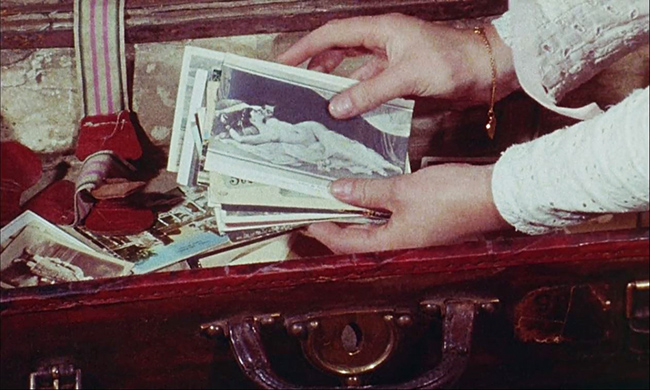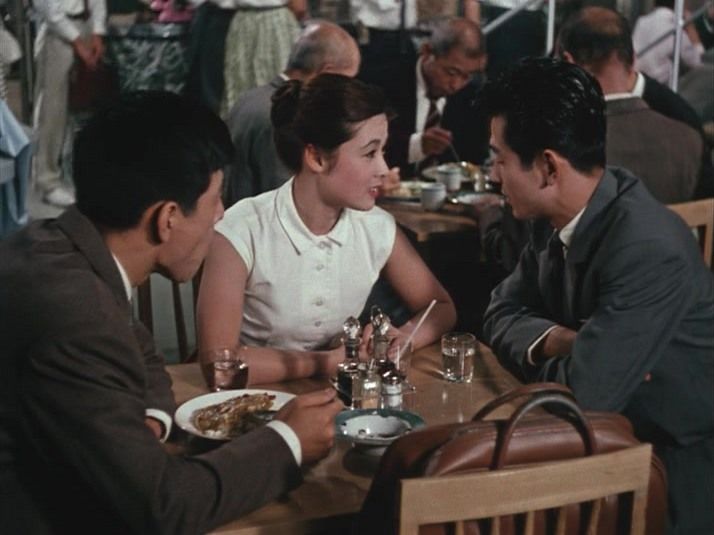Made on a ridiculously low budget and to a very tight four-week schedule, Jean Rollin somehow manages to create something evocative and eerie. The plot is rudimentary: a radioactive leak turns people into zombies, so they are imprisoned in an imposing corporate tower block and killed when the final brain-cell switches off. As with other zombie films, a nefarious corporate presence lurks in the background. The difference here is that the undead are innocent victims who are exploited and killed like sheep. This being Rollin, they are also beautiful and frequently unclothed, but you can read that in a reflexive direction if you want – the machine reducing people to attractive mindless bodies.
It ends up being a rather sweet film. The hero who is sucked into this nighttime conspiracy by the stunning Brigitte Lahaie is smitten, and joins her in becoming zombified. Perhaps love can't overcome all obstacles, but it's worth clinging on to nonetheless.
26.11.17
25.11.17
Immoral Tales
Borowczyk's four lewd, weird films don't really cohere without watching the introductory fifth. A Private Collection is just a catalogue of obscene objects, mostly of Borowczyk's own manufacture. In the enclosed space of a bourgeois flat dark secrets are revealed which underline the hypocrisy of the 'moral police'.
All very well as a tirade against censoring sex. But it's the sense of confinement that lingers. Borowczyk's eroticism is strangely sequestered and controlling. He beavers away at these films in the same way as he does his animations and props. It's a private universe in which he has the final say.
Thus we get a domineering youth who commands his cousin to fellate him while he lectures her on the movement of the tides. Then a girl besotted with the omniscient voice of God – which provides sexual comfort in an environment of abuse. Then Elizabeth Báthory using her noble status to round up and butcher maidens so she can bathe in their blood. And finally Lucrezia Borgia led into the papal palace to be 'worshipped' by her father and brother.
Borowczyk is detail-orientated. He lovingly lingers over the objects that crowd his films, which is why A Private Collection is the apotheosis of his erotica – human flesh removed entirely. He is a set designer with a camera, a builder of entrancing but lifeless tableaus.
All very well as a tirade against censoring sex. But it's the sense of confinement that lingers. Borowczyk's eroticism is strangely sequestered and controlling. He beavers away at these films in the same way as he does his animations and props. It's a private universe in which he has the final say.
Thus we get a domineering youth who commands his cousin to fellate him while he lectures her on the movement of the tides. Then a girl besotted with the omniscient voice of God – which provides sexual comfort in an environment of abuse. Then Elizabeth Báthory using her noble status to round up and butcher maidens so she can bathe in their blood. And finally Lucrezia Borgia led into the papal palace to be 'worshipped' by her father and brother.
Borowczyk is detail-orientated. He lovingly lingers over the objects that crowd his films, which is why A Private Collection is the apotheosis of his erotica – human flesh removed entirely. He is a set designer with a camera, a builder of entrancing but lifeless tableaus.
18.11.17
The Blue Sky Maiden (Blue Sky Daughter)
Masumura made a lot of films, only the more unconventional of which are well known in the West. I saw this at the BFI, and doubt it has a DVD release. There is no hint here of the perversities of Blind Beast or the gore of Red Angel. That said, Masumura’s interest in awkward family dynamics is front and centre, even if the genre is melodrama, and the ending happy.
Or so it may seem. Yuko is a Cinderella who finds a Prince Charming, but given everything we see of Tokyo living you wonder whether she was better off staying true to her roots and choosing the local boy from her village (her teacher, but that’s ok apparently). Yuko is illegitimate, and her father did her a favour when he sent her away from his nightmare of a family. Masumura is very good at showing that the fault ultimately lies with him. He was never reconciled to the loveless marriage he was talked into, and his indifference turned his wife into a harpy and his children into brats.
Yuko marries for love, but it’s another posh boy. There’s a subtle class divide bisecting the characters in the film, which Yuko steps over. A philosophy grad, Masumura’s sympathies lie closer to the philosophy-spouting delivery boy, as well as the hard-pressed family maid and the striving teacher-come-artist.
The plot comes from a novel, and Masumura handles the twists deftly. There’s a good deal of fancy camerawork where wide shots move into to closeups and back. And a satisfying shape to the film is provided by the opening and closing scenes on the shore, where blue sky thinking is embraced as a survival mechanism and then discarded when no longer needed. It’s accomplished, in other words, and goes to show that Masumura was good at this sort of thing. There’s a reason he made so many movies.
Or so it may seem. Yuko is a Cinderella who finds a Prince Charming, but given everything we see of Tokyo living you wonder whether she was better off staying true to her roots and choosing the local boy from her village (her teacher, but that’s ok apparently). Yuko is illegitimate, and her father did her a favour when he sent her away from his nightmare of a family. Masumura is very good at showing that the fault ultimately lies with him. He was never reconciled to the loveless marriage he was talked into, and his indifference turned his wife into a harpy and his children into brats.
Yuko marries for love, but it’s another posh boy. There’s a subtle class divide bisecting the characters in the film, which Yuko steps over. A philosophy grad, Masumura’s sympathies lie closer to the philosophy-spouting delivery boy, as well as the hard-pressed family maid and the striving teacher-come-artist.
The plot comes from a novel, and Masumura handles the twists deftly. There’s a good deal of fancy camerawork where wide shots move into to closeups and back. And a satisfying shape to the film is provided by the opening and closing scenes on the shore, where blue sky thinking is embraced as a survival mechanism and then discarded when no longer needed. It’s accomplished, in other words, and goes to show that Masumura was good at this sort of thing. There’s a reason he made so many movies.
11.11.17
Thor: Ragnarok
There's something interesting going on behind the jokes here. Director Taika Waititi casts himself as Korg, a failed revolutionary (he didn't print enough pamphlets haha) who leads an insurrection against Jeff Goldblum's gilded planetary Emperor. The film splices this rather awkwardly with the return of Hela to Asgard, but there is a parallel between the two stories. It turns out that before Odin became a cuddly grandpa enjoying his retirement, he and Hela were bloodthirsty empire-builders. Behind the paintings on the ceiling of the Asgardian throne room (which celebrate the virtue and diplomacy of Odin and his two sons) there is a darker history of conquest and genocide. There must be some resonance here for Waititi, who is from New Zealand and has a Māori father.
This may not just be a comment on the beastly British, but on how American soft power (of which Marvel Studios is a part) disguises the real hard power it can wield. The revolution isn't a joke, at least not entirely. Asgard falls at the end of the film – its people become refugees. Again there is a parallel with contemporary events, but the film flips it so it's not the victims of empire that are seeking sanctuary on Earth, but the beneficiaries. From being lords of the universe to being at the mercy of foreign hostile powers – there are bitter twists in this otherwise sugary cocktail of a film.
This may not just be a comment on the beastly British, but on how American soft power (of which Marvel Studios is a part) disguises the real hard power it can wield. The revolution isn't a joke, at least not entirely. Asgard falls at the end of the film – its people become refugees. Again there is a parallel with contemporary events, but the film flips it so it's not the victims of empire that are seeking sanctuary on Earth, but the beneficiaries. From being lords of the universe to being at the mercy of foreign hostile powers – there are bitter twists in this otherwise sugary cocktail of a film.
3.11.17
Red Angel
A very grim war film focused on a nurse on the front line and with plenty of horrible amputations, vomit and blood. As usual with Masumura, things take a turn for the bizarre and depraved. The hero is an angel in hell, who cannot countenance being responsible for other people’s deaths. The first of her ‘victims’ raped her, but she still tries to save him, in so doing establishing her saintly nature.
The film is at its most interesting when it explores the strange power dynamic of being a woman surrounded by damaged men. Nishi must suffer frequent sexual assault, but she is also the one holding soldiers down when their limbs are being removed. She is in a position to torture her torturers, but she never takes the opportunity, being loyal to the last.
Instead the film establishes a melodramatic romance between Nishi and a taciturn surgeon who is addicted to morphine. The drug makes him impotent, and Nishi has to hold him down as well through his withdrawal to cure him from that ailment. She helps to make a man out of him, and he dies with a broken sword in his hand. But she also gains power. In the sweetest scene in the film, the surgeon allows her to put on his lieutenant uniform, serves her wine and treats her like a man. Granted, he refuses to give her his sword and gun (there are limits to cross dressing and female empowerment), but it’s still a striking moment of reciprocity and empowerment.
The film is at its most interesting when it explores the strange power dynamic of being a woman surrounded by damaged men. Nishi must suffer frequent sexual assault, but she is also the one holding soldiers down when their limbs are being removed. She is in a position to torture her torturers, but she never takes the opportunity, being loyal to the last.
Instead the film establishes a melodramatic romance between Nishi and a taciturn surgeon who is addicted to morphine. The drug makes him impotent, and Nishi has to hold him down as well through his withdrawal to cure him from that ailment. She helps to make a man out of him, and he dies with a broken sword in his hand. But she also gains power. In the sweetest scene in the film, the surgeon allows her to put on his lieutenant uniform, serves her wine and treats her like a man. Granted, he refuses to give her his sword and gun (there are limits to cross dressing and female empowerment), but it’s still a striking moment of reciprocity and empowerment.
Subscribe to:
Comments (Atom)




